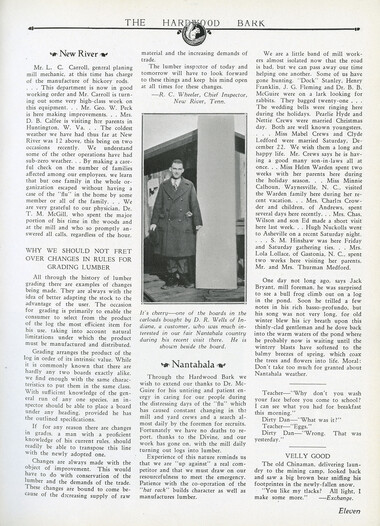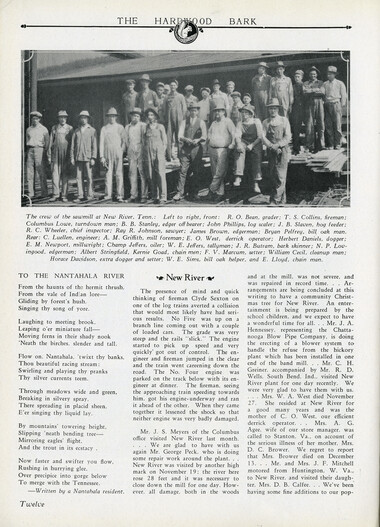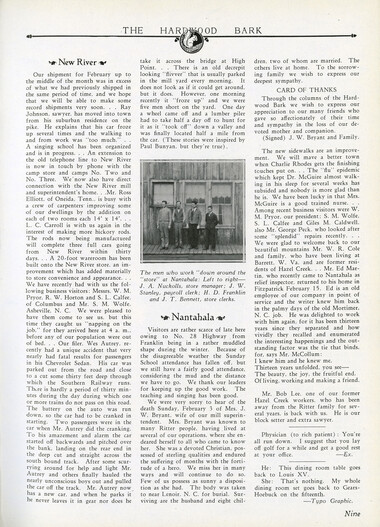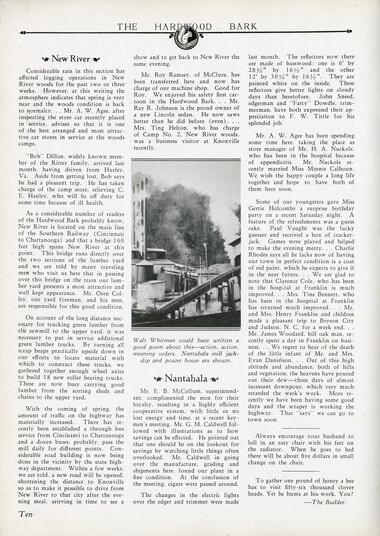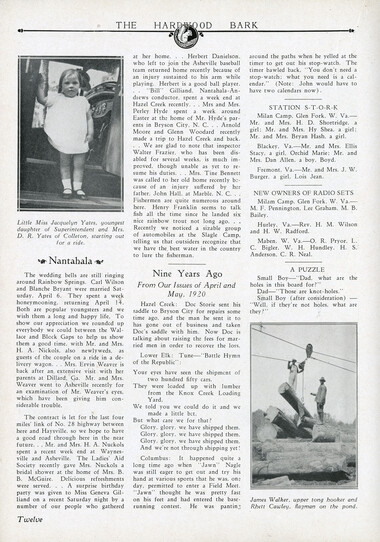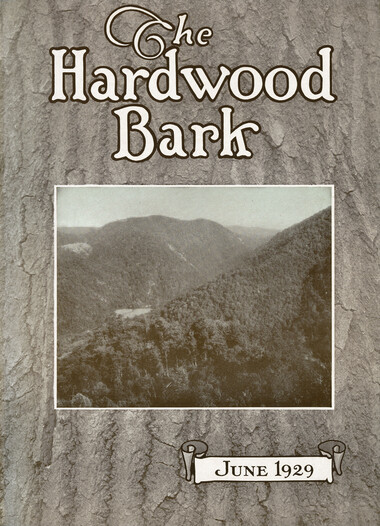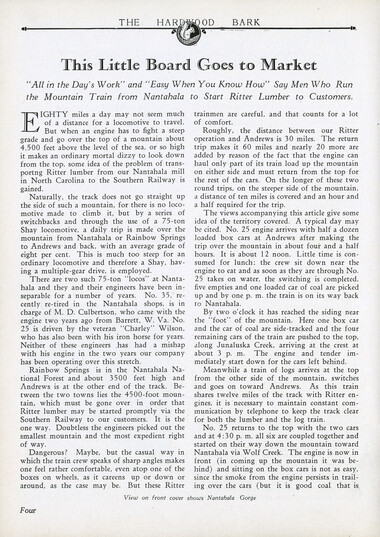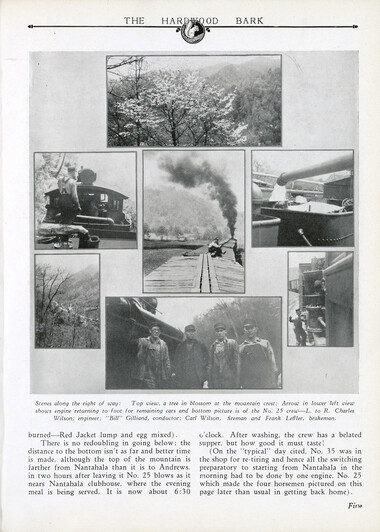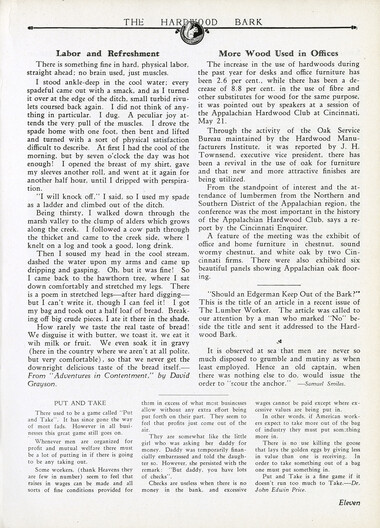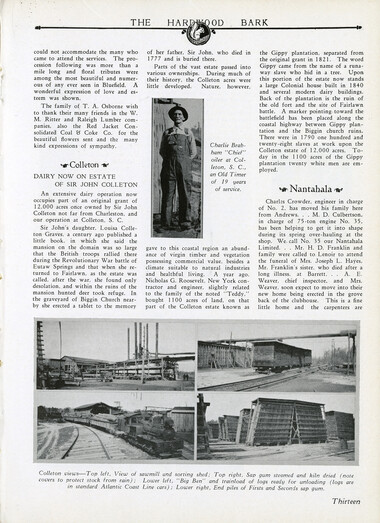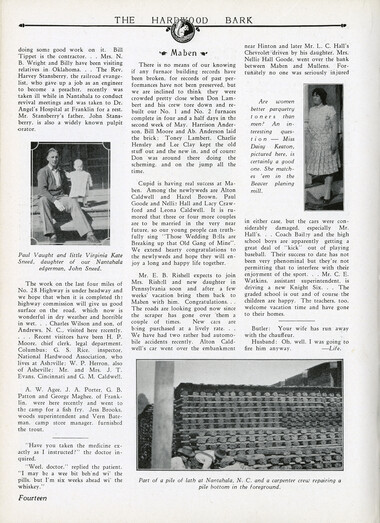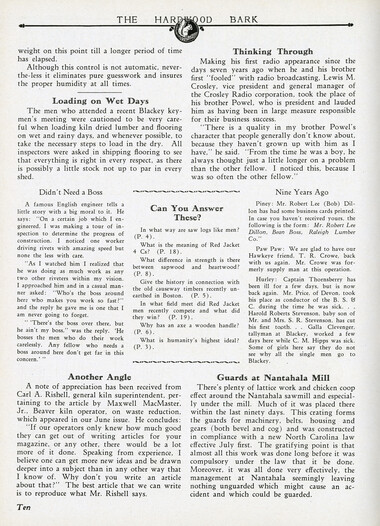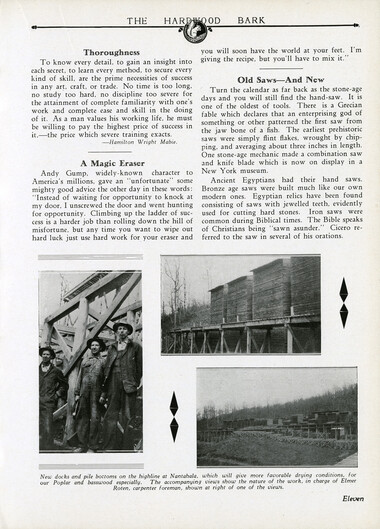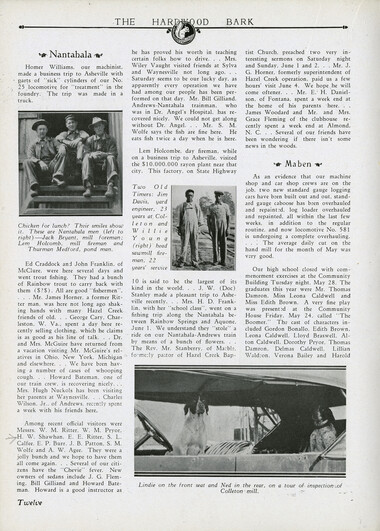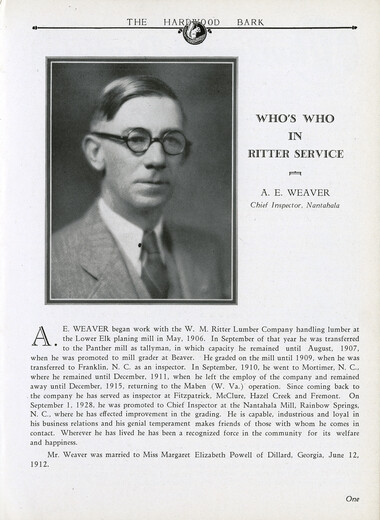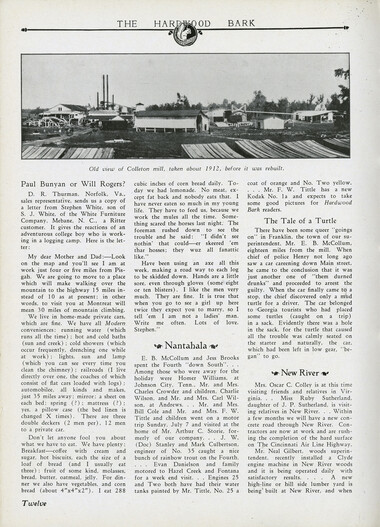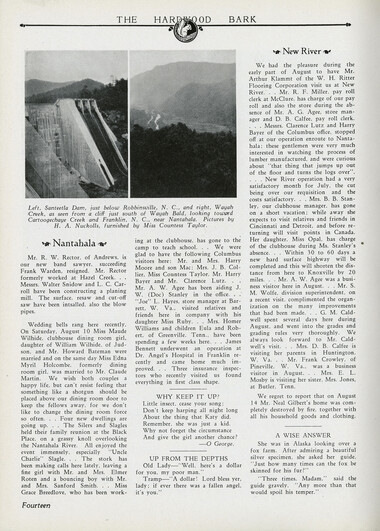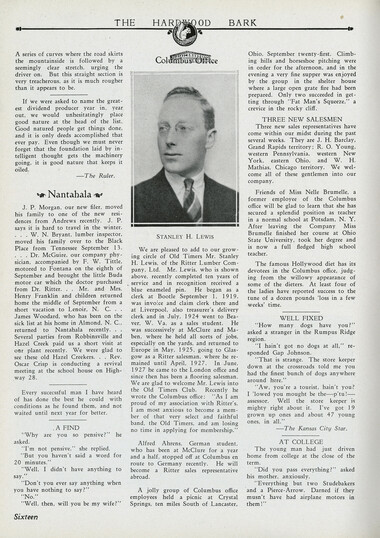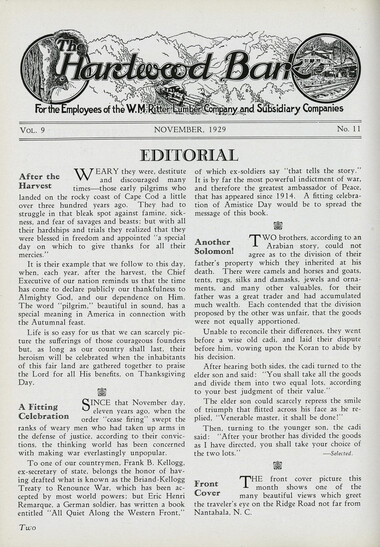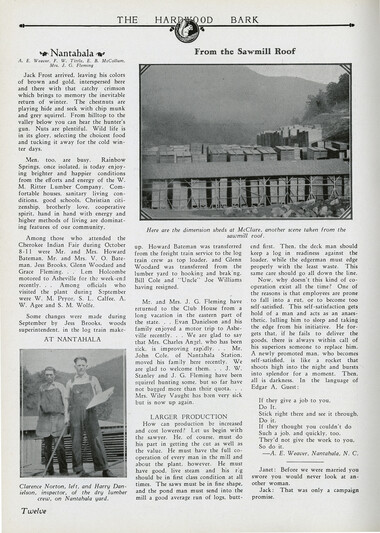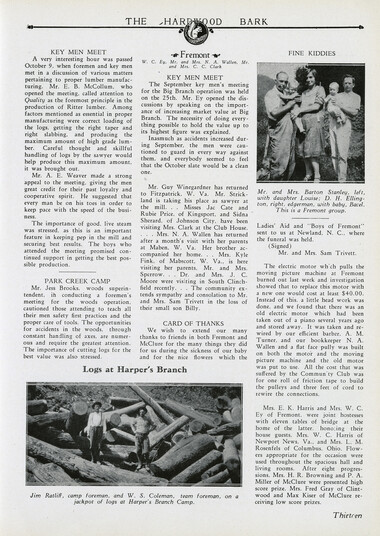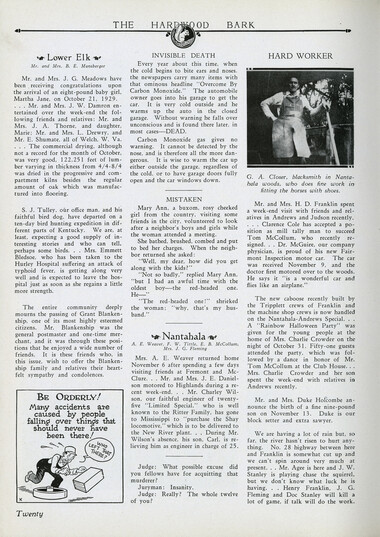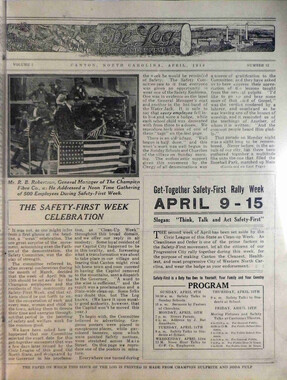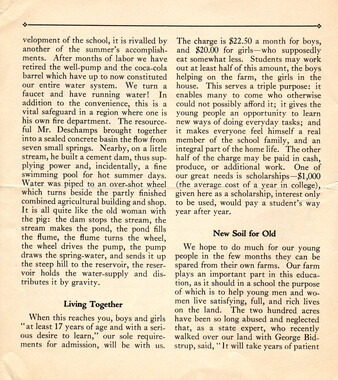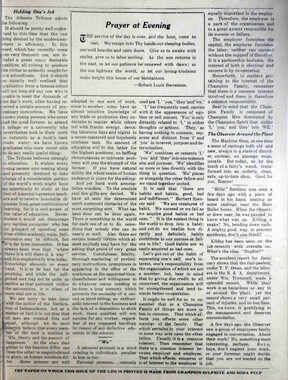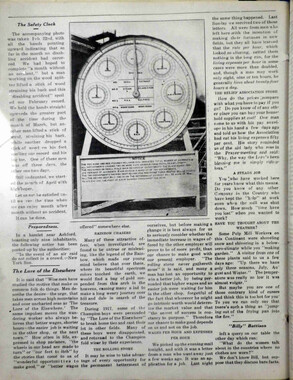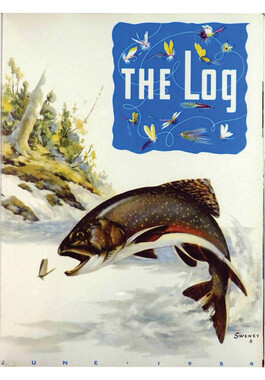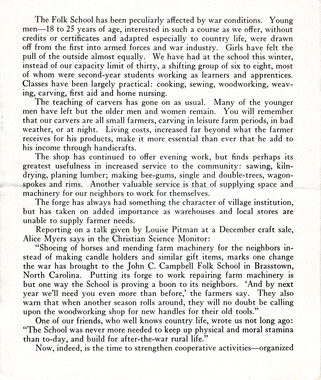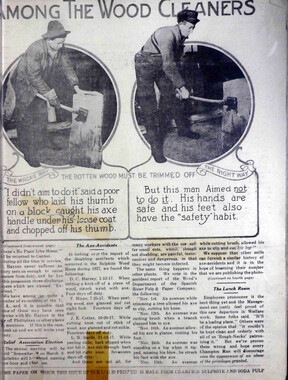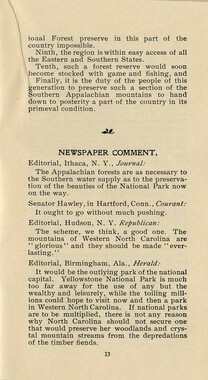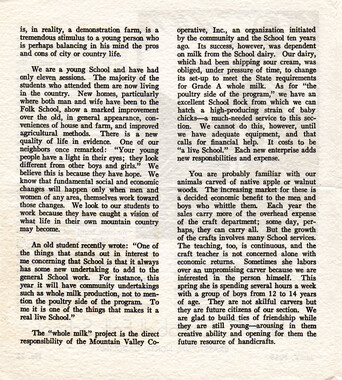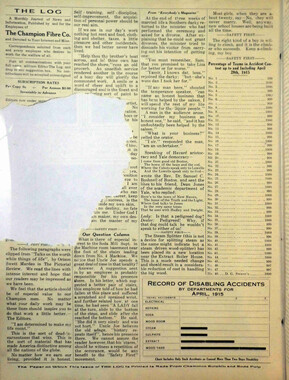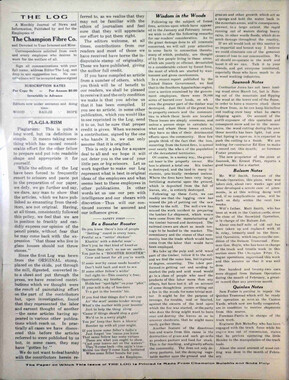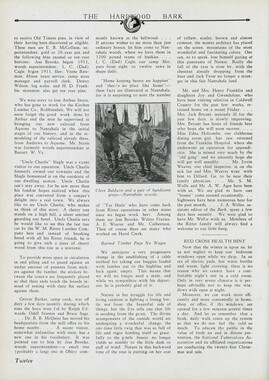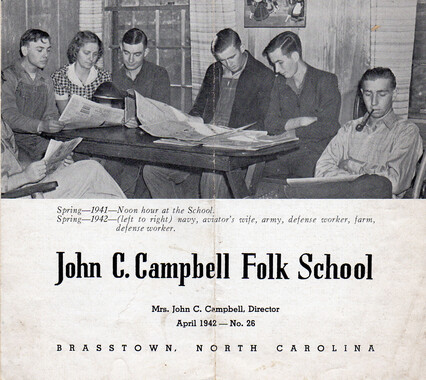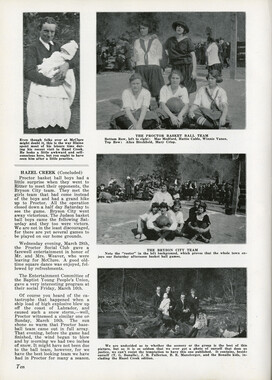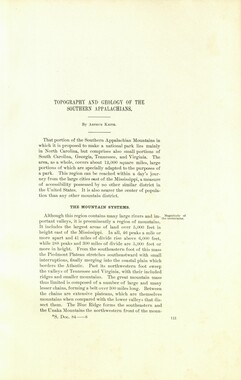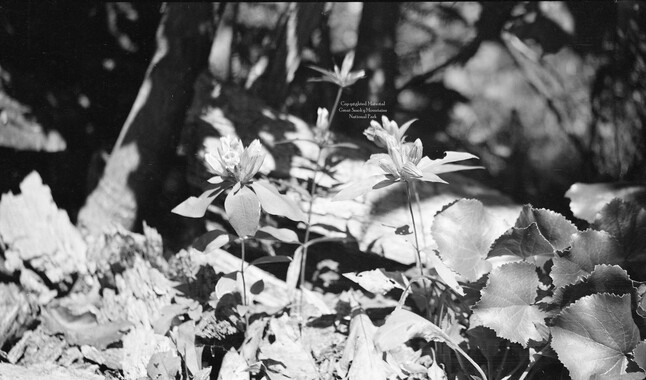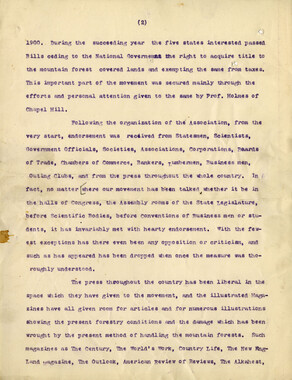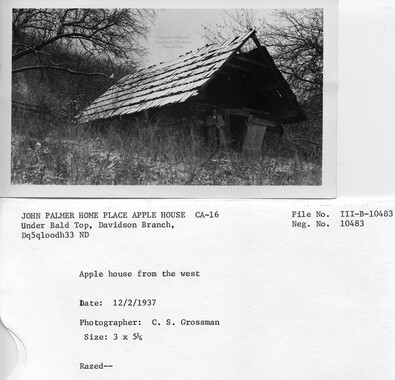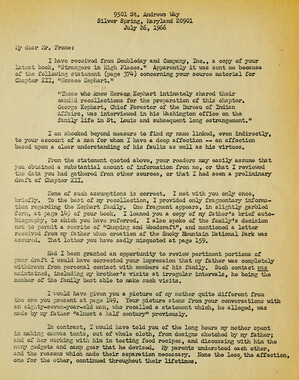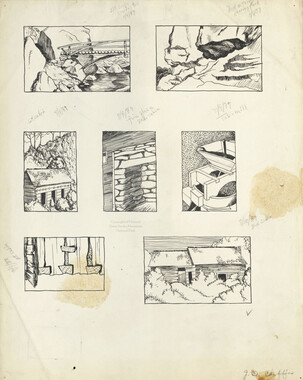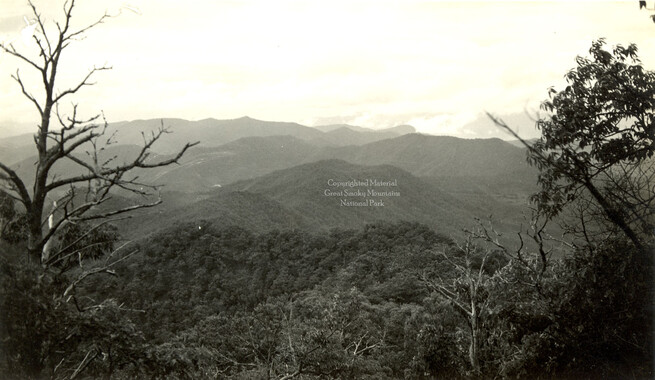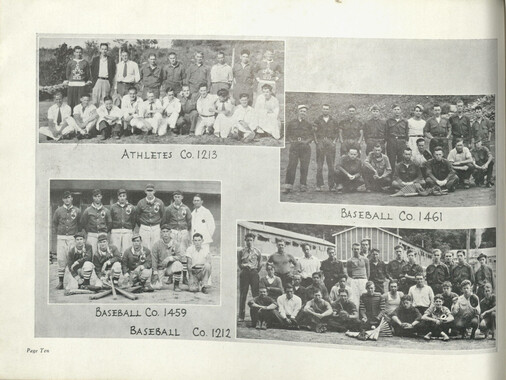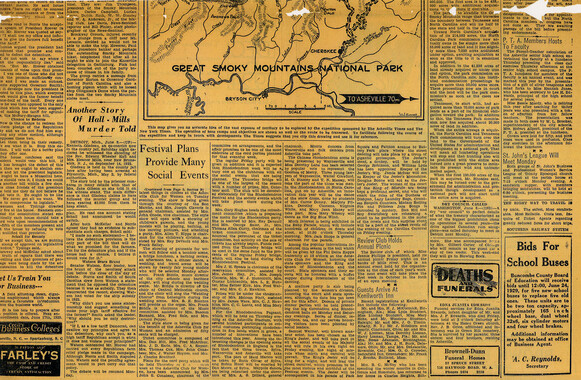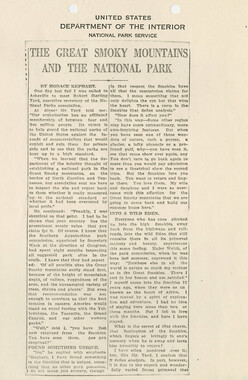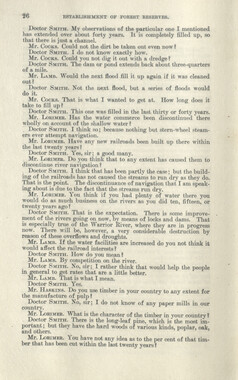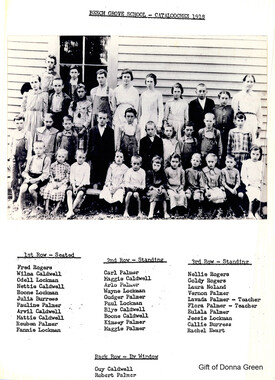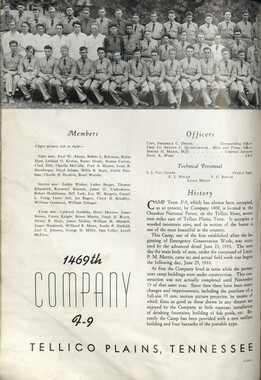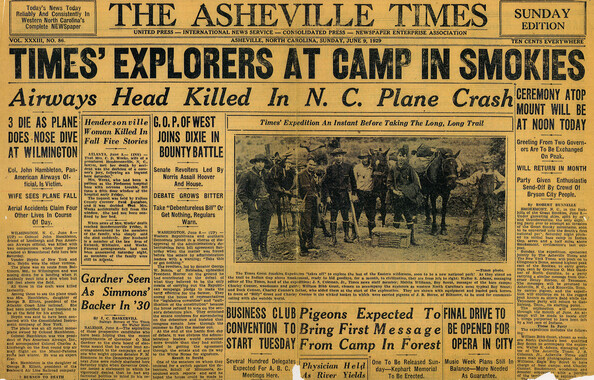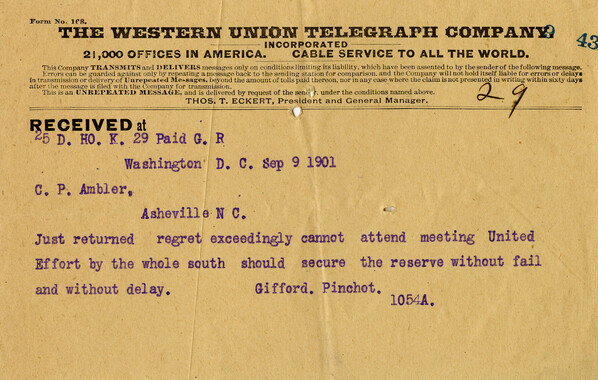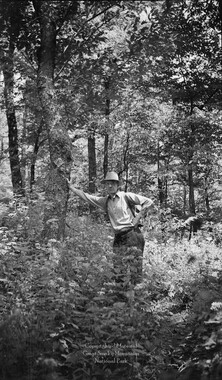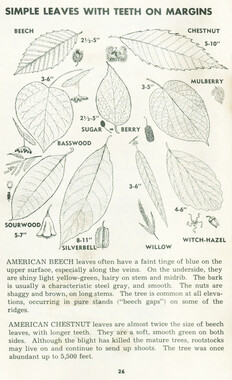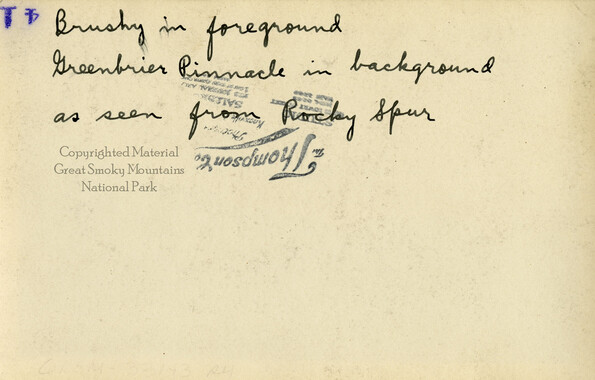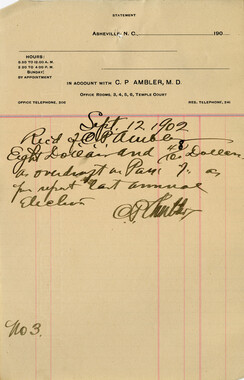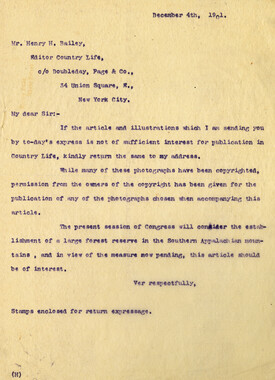Western Carolina University (21)
View all
- Canton Champion Fibre Company (2308)
- Cherokee Traditions (291)
- Civil War in Southern Appalachia (165)
- Craft Revival (1942)
- George Masa Collection (135)
- Great Smoky Mountains - A Park for America (2901)
- Highlights from Western Carolina University (422)
- Horace Kephart (941)
- Journeys Through Jackson (159)
- LGBTQIA+ Archive of Jackson County (85)
- Oral Histories of Western North Carolina (314)
- Picturing Appalachia (6798)
- Stories of Mountain Folk (413)
- Travel Western North Carolina (153)
- Western Carolina University Fine Art Museum Vitreograph Collection (129)
- Western Carolina University Herbarium (92)
- Western Carolina University: Making Memories (738)
- Western Carolina University Publications (2491)
- Western Carolina University Restricted Electronic Theses and Dissertations (146)
- Western North Carolina Regional Maps (71)
- World War II in Southern Appalachia (131)
University of North Carolina Asheville (6)
View all
- Allanstand Cottage Industries (62)
- Appalachian National Park Association (53)
- Bennett, Kelly, 1890-1974 (1463)
- Berry, Walter (76)
- Brasstown Carvers (40)
- Carver, George Washington, 1864?-1943 (26)
- Cathey, Joseph, 1803-1874 (1)
- Champion Fibre Company (233)
- Champion Paper and Fibre Company (297)
- Cherokee Indian Fair Association (16)
- Cherokee Language Program (22)
- Crowe, Amanda (40)
- Edmonston, Thomas Benton, 1842-1907 (7)
- Ensley, A. L. (Abraham Lincoln), 1865-1948 (275)
- Fromer, Irving Rhodes, 1913-1994 (70)
- George Butz (BFS 1907) (46)
- Goodrich, Frances Louisa (120)
- Grant, George Alexander, 1891-1964 (96)
- Heard, Marian Gladys (60)
- Kephart, Calvin, 1883-1969 (15)
- Kephart, Horace, 1862-1931 (313)
- Kephart, Laura, 1862-1954 (39)
- Laney, Gideon Thomas, 1889-1976 (439)
- Masa, George, 1881-1933 (61)
- McElhinney, William Julian, 1896-1953 (44)
- Niggli, Josephina, 1910-1983 (10)
- North Carolina Park Commission (105)
- Osborne, Kezia Stradley (9)
- Owens, Samuel Robert, 1918-1995 (11)
- Penland Weavers and Potters (36)
- Roberts, Vivienne (15)
- Roth, Albert, 1890-1974 (142)
- Schenck, Carl Alwin, 1868-1955 (1)
- Sherrill's Photography Studio (2565)
- Southern Highland Handicraft Guild (127)
- Southern Highlanders, Inc. (71)
- Stalcup, Jesse Bryson (46)
- Stearns, I. K. (213)
- Thompson, James Edward, 1880-1976 (226)
- United States. Indian Arts and Crafts Board (130)
- USFS (683)
- Vance, Zebulon Baird, 1830-1894 (1)
- Weaver, Zebulon, 1872-1948 (58)
- Western Carolina College (230)
- Western Carolina Teachers College (282)
- Western Carolina University (2008)
- Western Carolina University. Mountain Heritage Center (18)
- Whitman, Walt, 1819-1892 (10)
- Wilburn, Hiram Coleman, 1880-1967 (73)
- Williams, Isadora (3)
- Cain, Doreyl Ammons (0)
- Crittenden, Lorraine (0)
- Rhodes, Judy (0)
- Smith, Edward Clark (0)
- Appalachian Region, Southern (2693)
- Asheville (N.C.) (1936)
- Avery County (N.C.) (26)
- Blount County (Tenn.) (195)
- Buncombe County (N.C.) (1672)
- Cherokee County (N.C.) (283)
- Clay County (N.C.) (556)
- Graham County (N.C.) (236)
- Great Smoky Mountains National Park (N.C. and Tenn.) (519)
- Haywood County (N.C.) (3569)
- Henderson County (N.C.) (70)
- Jackson County (N.C.) (4913)
- Knox County (Tenn.) (35)
- Knoxville (Tenn.) (13)
- Lake Santeetlah (N.C.) (10)
- Macon County (N.C.) (420)
- Madison County (N.C.) (215)
- McDowell County (N.C.) (39)
- Mitchell County (N.C.) (132)
- Polk County (N.C.) (35)
- Qualla Boundary (982)
- Rutherford County (N.C.) (76)
- Swain County (N.C.) (2182)
- Transylvania County (N.C.) (270)
- Watauga County (N.C.) (12)
- Waynesville (N.C.) (86)
- Yancey County (N.C.) (72)
- Aerial Photographs (3)
- Aerial Views (60)
- Albums (books) (4)
- Articles (1)
- Artifacts (object Genre) (228)
- Bibliographies (1)
- Biography (general Genre) (2)
- Cards (information Artifacts) (38)
- Clippings (information Artifacts) (191)
- Copybooks (instructional Materials) (3)
- Crafts (art Genres) (622)
- Depictions (visual Works) (21)
- Design Drawings (1)
- Drawings (visual Works) (185)
- Envelopes (73)
- Exhibitions (events) (1)
- Facsimiles (reproductions) (1)
- Fiction (general Genre) (4)
- Financial Records (12)
- Fliers (printed Matter) (67)
- Glass Plate Negatives (381)
- Guidebooks (2)
- Internegatives (10)
- Interviews (815)
- Land Surveys (102)
- Letters (correspondence) (1013)
- Manuscripts (documents) (618)
- Maps (documents) (177)
- Memorandums (25)
- Minutes (administrative Records) (59)
- Negatives (photographs) (6090)
- Newsletters (1290)
- Newspapers (2)
- Notebooks (8)
- Occupation Currency (1)
- Paintings (visual Works) (1)
- Pen And Ink Drawings (1)
- Periodicals (193)
- Personal Narratives (10)
- Photographs (12976)
- Plans (maps) (1)
- Poetry (5)
- Portraits (4568)
- Postcards (329)
- Programs (documents) (181)
- Publications (documents) (2443)
- Questionnaires (65)
- Relief Prints (26)
- Sayings (literary Genre) (1)
- Scrapbooks (282)
- Sheet Music (2)
- Slides (photographs) (402)
- Songs (musical Compositions) (2)
- Sound Recordings (796)
- Specimens (92)
- Speeches (documents) (18)
- Tintypes (photographs) (8)
- Transcripts (322)
- Video Recordings (physical Artifacts) (23)
- Text Messages (0)
- A.L. Ensley Collection (275)
- Appalachian Industrial School Records (7)
- Appalachian National Park Association Records (336)
- Axley-Meroney Collection (2)
- Bayard Wootten Photograph Collection (20)
- Bethel Rural Community Organization Collection (7)
- Blumer Collection (5)
- C.W. Slagle Collection (20)
- Canton Area Historical Museum (2110)
- Carlos C. Campbell Collection (462)
- Cataloochee History Project (64)
- Cherokee Studies Collection (4)
- Daisy Dame Photograph Album (5)
- Daniel Boone VI Collection (1)
- Doris Ulmann Photograph Collection (112)
- Elizabeth H. Lasley Collection (1)
- Elizabeth Woolworth Szold Fleharty Collection (4)
- Frank Fry Collection (95)
- George Masa Collection (173)
- Gideon Laney Collection (452)
- Hazel Scarborough Collection (2)
- Hiram C. Wilburn Papers (28)
- Historic Photographs Collection (236)
- Horace Kephart Collection (861)
- Humbard Collection (33)
- Hunter and Weaver Families Collection (1)
- I. D. Blumenthal Collection (4)
- Isadora Williams Collection (4)
- Jesse Bryson Stalcup Collection (47)
- Jim Thompson Collection (224)
- John B. Battle Collection (7)
- John C. Campbell Folk School Records (80)
- John Parris Collection (6)
- Judaculla Rock project (2)
- Kelly Bennett Collection (1482)
- Love Family Papers (11)
- Major Wiley Parris Civil War Letters (3)
- Map Collection (12)
- McFee-Misemer Civil War Letters (34)
- Mountain Heritage Center Collection (4)
- Norburn - Robertson - Thomson Families Collection (44)
- Pauline Hood Collection (7)
- Pre-Guild Collection (2)
- Qualla Arts and Crafts Mutual Collection (12)
- R.A. Romanes Collection (681)
- Rosser H. Taylor Collection (1)
- Samuel Robert Owens Collection (94)
- Sara Madison Collection (144)
- Sherrill Studio Photo Collection (2558)
- Smoky Mountains Hiking Club Collection (616)
- Stories of Mountain Folk - Radio Programs (374)
- The Reporter, Western Carolina University (510)
- Venoy and Elizabeth Reed Collection (16)
- WCU Gender and Sexuality Oral History Project (32)
- WCU Mountain Heritage Center Oral Histories (25)
- WCU Oral History Collection - Mountain People, Mountain Lives (71)
- WCU Students Newspapers Collection (1923)
- Western North Carolina Tomorrow Black Oral History Project (69)
- William Williams Stringfield Collection (2)
- Zebulon Weaver Collection (109)
- African Americans (390)
- Appalachian Trail (35)
- Artisans (521)
- Cherokee art (84)
- Cherokee artists -- North Carolina (10)
- Cherokee language (21)
- Cherokee pottery (101)
- Cherokee women (208)
- Church buildings (190)
- Civilian Conservation Corps (U.S.) (111)
- College student newspapers and periodicals (2012)
- Dams (107)
- Dance (1023)
- Education (222)
- Floods (61)
- Folk music (1015)
- Forced removal, 1813-1903 (2)
- Forest conservation (220)
- Forests and forestry (1195)
- Gender nonconformity (4)
- Great Smoky Mountains National Park (N.C. and Tenn.) (181)
- Hunting (45)
- Landscape photography (25)
- Logging (119)
- Maps (83)
- Mines and mineral resources (8)
- North Carolina -- Maps (18)
- Paper industry (38)
- Postcards (255)
- Pottery (135)
- Railroad trains (72)
- Rural electrification -- North Carolina, Western (3)
- School integration -- Southern States (2)
- Segregation -- North Carolina, Western (5)
- Slavery (5)
- Sports (452)
- Storytelling (243)
- Waterfalls -- Great Smoky Mountains (N.C. and Tenn.) (66)
- Weaving -- Appalachian Region, Southern (280)
- Wood-carving -- Appalachian Region, Southern (328)
- World War, 1939-1945 (173)
Hardwood Bark, 1929
Item
Item’s are ‘child’ level descriptions to ‘parent’ objects, (e.g. one page of a whole book).
-
-
«•- THE HAR'MfiD-OD BARK •-ar New River <•* Mr. L. C. Carroll, general planing mill mechanic, at this time has charge of the manufacture of hickory rods. . . . This department is now in good working order and Mr. Carroll is turning out some very high-class work on this equipment. . . Mr. Geo. W. Peck is here making improvements. . . Mrs. D. B. Calfee is visiting her parents in Huntington, W. Va. . . The coldest weather we have had thus far at New River was 1 2 above, this being on two occasions recently. We understand some of the other operations have had sub-zero weather. . . By making a careful check on the number of families affected among our employees, we learn that but one family in the whole organization escaped without having a case of the "flu" in the home by some member or all of the family. . . We are very grateful to our physician, Dr. T. M. McGill, who spent the major portion of his time in the woods and at the mill and who so promptly answered all calls, regardless of the hour. WHY WE SHOULD NOT FRET OVER CHANGES IN RULES FOR GRADING LUMBER All through the history of lumber grading there are examples of changes being made. They are always with the idea of better adapting the stock to the advantage of the user. The occasion for grading is primarily to enable the consumer to select from the product of the log the most efficient item for his use, taking into account natural limitations under which the product must be manufactured and distributed. Grading arranges the product of the log in order of its intrinsic value. While it is commonly known that there are hardly any two boards exactly alike, wc find enough with the same characteristics to put them in the same class. With sufficient knowledge of the general run of any one species, an inspector should be able to place a board under any heading; provided he has the outlined specifications. If for any reason there are changes m grades, a man with a proficient knowledge of his current rules, should readily be able to transpose this line with the newly adopted one. Changes are always made with the object of improvement. This would have to do with conservation of the lumber and the demands of the trade. These changes are bound to come because of the decreasing supply of raw material and the increasing demands of trade. The lumber insp:ctor of today and tomorrow will have to look forward to these things and keep his mind open at all times for these changes. —R. C. Wheeler, Chief Inspector, New River, Tenn. It's cherry—one of the boards in the carloads bought by D. R. Wells of Indiana, a customer, who was much interested in our fair Nantahala country during his recent visit there. He is shown beside the board. **r Nantahala is* Through the Hardwood Bark we wish to extend our thanks to Dr. McGuire for his untiring and patient energy in caring for our people during the distressing days of the "flu" which has caused constant changing in the mill and yard crews and a search almost daily by the foremen for recruits. Fortunately we have no deaths to report, thanks to the Divine, and our work has gone on, with the mill daily turning out logs into lumber. Experience of this nature reminds us that we are "up against" a real competitor and that we must draw on our resourcefulness to meet the emergency. Patience with the co-operation of the "hat rack" builds character as well as manufactures lumber. We are a little band of mill workers almost isolated now that the road is bad, but we can pass away our time helping one another. Some of us have gone hunting. "Dock" Stanley, Henry Franklin, J. G. Fleming and Dr. B. B. McGuire were on a lark looking for rabbits. They bagged twenty-one . . . The wedding bells were ringing here during the holidays. Pearlie Hyde and Nettie Crews were married Christmas day. Both are well known youngsters. ... Miss Mabel Crews and Clyde Ledford were married Saturday, December 22. We wish them a long and happy life. Mr. Crews says he is having a good many son-in-laws all at once. . . Miss Helen Warden spent two weeks with her parents here during the holiday season. . . Miss Minnie Calhoun, Waynesville, N. C, visited the Warden family here during her recent vacation. . . Mrs. Charles Crowder and children, of Andrews, spent several days here recently. . . Mrs. Chas. Wilson and son Ed made a short visit here last week. . . Hugh Nuckolls went to Asheville on a recent Saturday night. . . . S. M. Hinshaw was here Friday and Saturday gathering ties. . . Mrs. Lola Lollace, of Gastonia, N. C, spent two weeks here visiting her parents, Mr. and Mrs. Thurman Medford. One day not long ago, says Jack Bryant, mill foreman, he was surprised to see a bull frog climb out on a log in the pond. Soon he trilled a few notes in his rich basso-profundo, but his song was not very long, for old winter blew his icy breath upon this thinly-clad gentleman and he dove back into the warm waters of the pond where he probably now is waiting until the wintery blasts have softened to the balmy breezes of spring, which coax the trees and flowers into life. Moral: Don't take too much for granted about Nantahala weather. Teacher—"Why don't you wash your face before you come to school? I can see what you had for breakfast this morning." Dirty Dan—"What was it?" Teacher—' 'Eggs." Dirty Dan—"Wrong. That was yesterday." VELLY GOOD The old Chinaman, delivering laundry to the mining camp, looked back and saw a big brown bear sniffing his footprintes in the newly-fallen snow. "You like my tlacks? All light, I make some more." —Exchange. Eleven
Object
Object’s are ‘parent’ level descriptions to ‘children’ items, (e.g. a book with pages).
-
“The Hardwood Bark” was a publication produced “for the employees of the W.M Ritter Lumber Co.” William McClellan Ritter (1864-1952) organized the company in 1901 and, from 1903 until 1926, the company operated on Hazel Creek in Swain County, North Carolina, before moving its operations to Nantahala. Published during the 1920s, the monthly newsletter typically ran to about 25 pages. “The Hardwood Bark” was filled with articles on the Ritter company and the timber industry, but also included local stories. The pages included in this collection were selected because they relate to communities within the Great Smoky Mountains National Park. The town of Ritter was near the junction of Hazel Creek and the Little Tennessee River; a sawmill was built at Proctor, about four miles north of Ritter. The town of Ritter has long since been abandoned and Proctor is beneath the waters of Fontana Lake.
-
